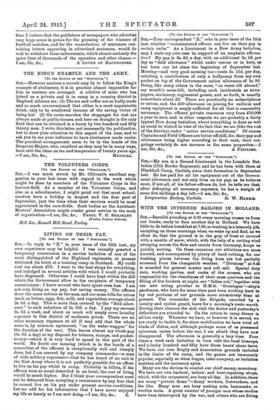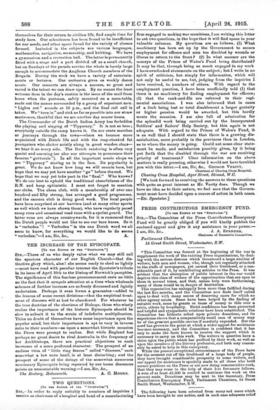WITH THE INTERNED SAILORS IN HOLLAND.
CT. ran Eons. Or Tom ••BrOC2,701..1 Silk—Reveille sounding at 6.30 every morning rouses us from our bunks, ready to face another day in Holland. We have little to do before breakfast at 7.30, so washing is a leisurely job, excepting on those mornings when we wake up and find, as we often do, that the ground is in the grip of frost or covered with a mantle of snow, which, with the help of a cutting wind sweeping across the flats and canals from Germany, keeps us quickly moving. On these occasions our ablutions are more hurried, and accompanied by plenty of bard rubbing, for our washing places between the living huts are but partially screened from the changeable weather. "Divisions " at 8.45 is sounded for general muster and roll call. Special duty men, working parties, and cooks of the messes, who are responsible for the cleanlineu of their mess quarters and the filling of fire buckets at night, are " fallen out," together with our new rating peculiar to H.M.S. ' Groningen '—ehip's gardeners, who have for some time past been working hard to lay out portions of our grounds more attractively than at present. The remainder of the Brigade, escorted by • cavalry and cyclist guard, leave for a morning, route march. During their absence the sick visit the doctor and yesterday's defaulters are attended to. On the return to camp dinner ix all but ready. Whatever we have, or however it is served, we are ready to tackle it, for since mobilization we have tried all kinds of dishes, and although perhaps some of us possessed epicurean tastes before the war, I am afraid they have now disappeared. The afternoon is generally a lazy time. Four times a week each battalion in turn visit the local bioscope. and a lucky hundred and fifty have three hours' shore leave. We have our own Rugby and Association ground, included in the limits of the camp, and the games are immensely popular, especially no when league, inter-company, or battalion matches add the necessary spire.
Many are the devices to combat our chief enemy, monotony. We have our own barbers', tailors', and boot-repairing shops, which, with the carpenters', are busy all day. In addition. there are many "private firms "—fancy workers, fretworkers, and the like. Many men are buy making net., hammocks, or woollen mate. A great number of younger men whose studies have been interrupted by the war, and others who are fitting themselves for their return to civilian life, find ample time for study here. Our schoolroom has been found to be insufficient for our needs, and other space found for the variety of classes formed. Included in the subjecte are various languages, mathematics. navigation, seamanship, and knitting. We have a gymnasium and a recreation ball. The hitter is permanently fitted with a stage and a part divided off as a small church, but on Sundays at the parade service the whole is barely large enough to accommodate the Anglican Church members of the Brigade. During the week we have a variety of entertain- ments or lectures. Our orchestra gives us weekly dance music. Our concerts are always a success, so great and varied is the talent we can draw upon. By no means the least welcome item in the day's routine is the imam of the mail from home when the postman, safely mounted on a mess-table, reads out the names surrounded by a group of expectant men. "Lights out" sounds at 10 p.m., and the final roll call is taken. We" turn in" and sink as fares poeei hie into our straw mattresses, thankful that we are another day nearer home.
The Commander of the Dutch Indian Army hair forbidden the playing and singing of "Tipperary." It is not so here; everybody outride the camp knows it. On our route marches or journeys through the town—where we become more acquainted with Dutch life and with the rosy-cbeeked fat youngsters who clatter noisily along in great wooden clogs— we hear it on every side. The Dutch rendering is often very quaint and amusing (so also our attempts to pronounce their famous "gutturals "). In all the important music shops we see " Tipperary " staring us in the face. Its popularity is great. We do not know how long we will remain here, but hope that we may yet have another "go" before the end. We hope that we may yet take part in the "final." Who knows P We do onr beet to uphold the traditional cheerfulness of the R.N. and keep optimistic. I most not forget to mention our clubs. The chess club, with a membership of over one hundred and fifty strong, has arranged a good programme. and the camera club is doing good work. The local people have been surprised at our harriers (and at many other sports as well which we have shown them), who have regularly paced camp runs and occasional road runs with a cyclist guard. The latter runs are always countrywarda, for it is rumoured that the Dutch people would not like to see our bare knees. So it is " verboden" I " Verboden " is the one Dutch word we all seem to know, for everything we would like to-do seems















































 Previous page
Previous page